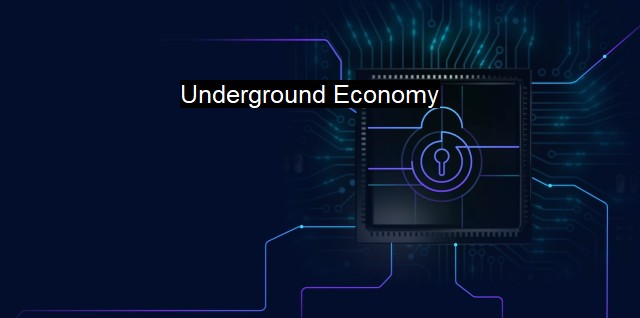What is Underground Economy?
Exploring the Dark Side: Insights into the Underground Economy and Its Impacts on Cybersecurity and Government Revenue
The "underground economy" in the context of cybersecurity and antiviruses refers to a thriving black market where cybercriminals trade, sell and horn their illicit skills. Underground economies are digital markets that play a critical role in the cybercrime community, where trade ranges from stolen credit card information to credentials, from malicious software to exploitation techniques. Here, exchange of commodities is not limited to tangible goods but rampant with intangible items like information and services, often leading to significant losses to individuals, businesses and governments.Within this digital black market, cybercriminals try their luck peddling everything from Controlled Substances to Cyber Tools and resources. Controlled substances include personal identifying information, passwords, organisation sensitive information, banking records and many more. Cyber tools and resources comprise software packages containing viruses, worms and Trojan horses, botnets, malware, spyware, phishing kits, and source code for performing various illicit activities.
Certain hackers even offer Software-as-a-service (SaaS), where various kinds of malicious software are tailored to fit the specific needs of 'clients.' Detailed guidelines, customer support, software updates and warranties are available sharing striking similarity with legal software companies, underlining how sophisticated the infrastructure of this underground economy has become.
In the underground economy of cybersecurity, often prices for various services and products are not fixed and can be haggled. Payment systems also emulate mainstream business models, including various types of transactions options like Bitcoin and other forms of cryptocurrency, wire transfer or Web-based money service.
One interesting facet of this black-market place is 'splitting'. The hacker responsible for getting illicit access doesn't directly sell the acquired goods or services but sells the access to a third-party vendor. This third-party consortium becomes responsible for its marketing and sometimes even providing customer support once the actual transaction takes place.
Thus, the underground economy has evolved into an ecosystem that is dynamic, complicated and dangerous. Cybersecurity companies often find themselves in a constant tug-of-war, combating threats birthed from these dark zones, developing newer malicious software and tactics that must constantly counteract.
Antivirus software is critical in fending off malicious programs that can clandestinely install themselves, spy on users or conduct illicit activities. Information from security breaches often becomes prized commodities in the underground economy, and robust antivirus tools are the first line of defence for many users.
Antivirus developers must constantly work to adapt to ever-evolving threats proliferated within the underground economy. Security vulnerabilities exploited by cybercriminals pushing their illicit services and products in these digital black markets often pave the way for mass infection. Hence, effective cybersecurity measures employ updated antivirus software alongside regular user education about the ways of this underground industry to safeguard themselves.
An understanding of the underground economy in cybersecurity and antiviruses is vital to comprehend the persistent threats online. The high stakes game of digital cat and mouse between criminals operating within these zones and security software developers isn't slowing down anytime soon. Antivirus software is a crucial element in securing systems from the myriad threats that originate and are disseminated from the underground economy. Policymakers and businesses should invest heavily in cybersecurity measures to protect and equip themselves well against these stealthy but relentless cyber challenges.

Underground Economy FAQs
What is the underground economy in the context of cybersecurity and antivirus?
The underground economy in cybersecurity and antivirus refers to illegal trade or exchange of malware, stolen data, and other malicious tools that are used to compromise systems and networks.How does the underground economy affect cybersecurity and antivirus?
The underground economy is a significant threat to cybersecurity and antivirus because it provides an avenue for cybercriminals to trade and exchange malicious tools and data. This makes it easier for them to launch more sophisticated attacks and evade detection by security software.What is the role of antivirus software in combating the underground economy?
Antivirus software plays a critical role in combating the underground economy by detecting and blocking malware and other malicious tools that are used by cybercriminals. It also helps to prevent the spread of viruses and other malware by scanning files and programs for known threats.How can individuals and organizations protect themselves from the underground economy in cybersecurity and antivirus?
Individuals and organizations can protect themselves from the underground economy in cybersecurity and antivirus by ensuring that they have robust security measures in place, including using reputable antivirus software, updating their systems and software regularly, and limiting access to sensitive data. It is also important to educate employees and customers about the risks of cybercrime and how to avoid falling victim to it.| | A | | | B | | | C | | | D | | | E | | | F | | | G | | | H | | | I | | | J | | | K | | | L | | | M | |
| | N | | | O | | | P | | | Q | | | R | | | S | | | T | | | U | | | V | | | W | | | X | | | Y | | | Z | |
| | 1 | | | 2 | | | 3 | | | 4 | | | 7 | | | 8 | | |||||||